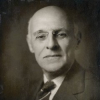Abraham Flexner

Abraham Flexner
Abraham Flexnerwas an American educator, best known for his role in the 20th century reform of medical and higher education in America and Canada...
NationalityAmerican
ProfessionEducator
Date of Birth13 November 1866
CountryUnited States of America
facts students patient
The student is to collect and evaluate facts. The facts are locked up in the patient.
world senses
The world in which we live is the only world about which our senses can testify.
careers curiosity firsts
At no period of [Michael Faraday's] unmatched career was he interested in utility. He was absorbed in disentangling the riddles of the universe, at first chemical riddles, in later periods, physical riddles. As far as he cared, the question of utility was never raised. Any suspicion of utility would have restricted his restless curiosity. In the end, utility resulted, but it was never a criterion to which his ceaseless experimentation could be subjected.
true-friend lasts meals
You have had your last bad meal. But, you have also heard your last honest compliment, and you have lost your last true friend.
science self play
We must not overlook the role that extremists play. They are the gadflies that keep society from being too complacent or self-satisfied; they are, if sound, the spearhead of progress. If they are fundamentally wrong, free discussion will in time put an end to them.
war dollars care
The new naval treaty permits the United States to spend a billion dollars on warships-a sum greater than has been accumulated by all our endowed institutions of learning in their entire history. Unintelligence could go no further! ... In Great Britain, the situation is similar. ... Until the figures are reversed, ... nations deceive themselves as to what they care about most.
dark cows looks
Mathematicians, like cows in the dark, all look alike to me.
medicine physicians chance
A patient had a 50-50 chance of benefiting from visiting a physician as of 1910. Medicine was more like voodoo than science until the 20th Century.
passion thinking intellectual
Curiosity, which may or may not eventuate in something useful, is probably the most outstanding characteristic of modern thinking ... Institutions of learning should be devoted to the cultivation of curiosity, and the less they are deflected by the consideration of immediacy of application, the more likely they are to contribute not only to human welfare, but to the equally important satisfaction of intellectual interest, which may indeed be said to have become the ruling passion of intellectual life in modern times.
real men wings
The real enemy is the man who tries to mold the human spirit so that it will not dare to spread its wings.
teaching knowledge men
There are men that teach best by not teaching at all.
attitude teaching skills
Medical education is not just a program for building knowledge and skills in its recipients... it is also an experience which creates attitudes and expectations.
education peace war
Nations have recently been led to borrow billions for war; no nation has ever borrowed largely for education... no nation is rich enough to pay for both war and civilization. We must make our choice; we cannot have both.
motivational science problem
Science, in the very act of solving problems, creates more of them.